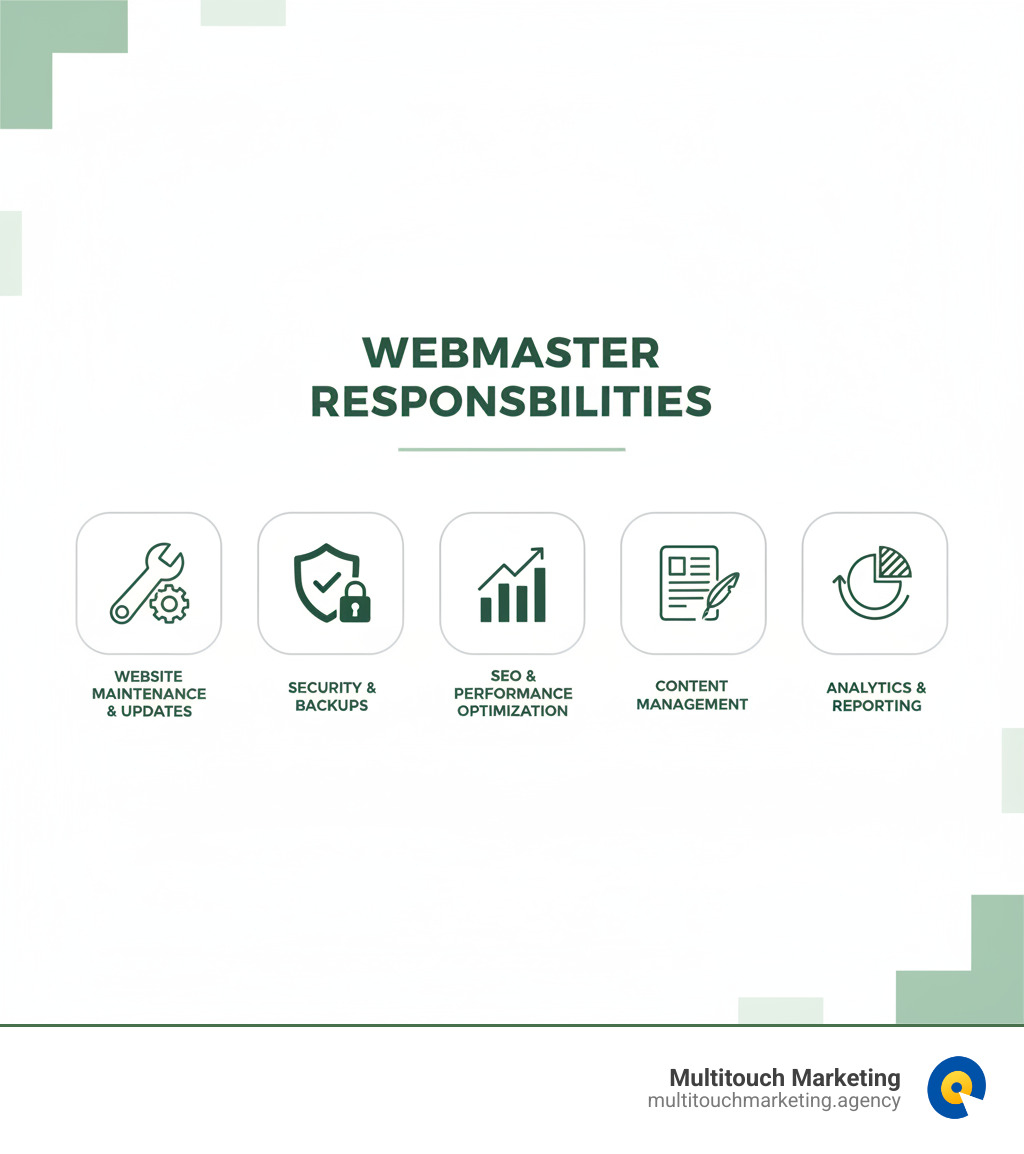Why Your Small Business Needs a Digital Partner
A small business webmaster is a professional who manages your website’s technical health, security, and performance. They handle everything from software updates and security monitoring to SEO improvements and content management, allowing you to focus on running your business while ensuring your online presence drives growth.
Quick Answer: What Does a Small Business Webmaster Do?
- Maintains & Secures: Handles updates, backups, bug fixes, and security patches.
- Optimizes & Improves: Manages SEO, keyword strategy, site speed, and mobile-friendliness.
- Manages & Monitors: Oversees content updates, provides technical support, and reports on performance.
If you’re like most small business owners, you’re already wearing too many hats. You’re the CEO, accountant, and HR department—you shouldn’t also have to be a tech expert to keep your website running smoothly.
Your website is your 24/7 salesperson and brand ambassador. When it crashes, loads slowly, or gets hacked, you lose sales. When it ranks poorly on Google, potential customers never find you. Research shows that at least 90% of small business websites underperform or fail entirely, often because owners try to manage everything themselves, leading to outdated software and missed opportunities.
That’s where a small business webmaster becomes your secret weapon. They are your strategic partner for online success, handling the technical complexities so you can focus on what you do best: running your business.
I’m Milton Brown, and since 2008, I’ve managed digital marketing campaigns for businesses with budgets from $20,000 to $5 million. I’ve seen how a skilled webmaster can transform a struggling website into a powerful growth engine. Let’s explore how this role can do the same for you.
What is a Small Business Webmaster? (And Why You Need One)
A small business webmaster is your website’s guardian, manager, and strategic partner. They are responsible for keeping your online presence healthy, performing well, and driving business growth. If your website is your digital storefront, the webmaster ensures the lights stay on and customers can easily find what they need.
The modern webmaster role is comprehensive. While they handle technical tasks like coding and server management, they are also involved in design, SEO, content strategy, and marketing integration. They act as a central hub, either handling all website-related tasks or coordinating with specialists to ensure every part of your site works together seamlessly.
Their core mission is to make your website intuitive, compelling, accessible, and mobile-friendly. Most small businesses lack in-house technical expertise, and keeping up with technology, security threats, and SEO is a full-time job. A webmaster frees you from these technical headaches and helps you leverage your online presence for real growth.
The Tangible Benefits: Performance, Security, and UX
Hiring a webmaster is about proactive improvement that impacts your bottom line.
-
Speed: A webmaster optimizes your site for speed by compressing images and cleaning up code. A slow website sends visitors to your competitors, and every second of delay can mean lost sales.
-
User Experience (UX): They ensure visitors can find what they’re looking for with clear layouts and paths to action. A good UX means visitors stay longer and are more likely to convert.
-
Mobile-Friendliness: With most traffic coming from mobile devices, a webmaster ensures your site looks and functions flawlessly on any screen size. This is critical for search rankings and user engagement. Learn more about why Responsive Web Design is critical for your business.
-
Security: Small businesses are prime targets for cyberattacks. A webmaster implements robust security, runs regular scans, and keeps software updated to patch vulnerabilities. They also manage backups to ensure quick recovery in a worst-case scenario.
-
ADA Compliance: Making your website accessible to people with disabilities is not only the right thing to do but often a legal requirement. A webmaster helps ensure your site meets standards like the Web Content Accessibility Guidelines (WCAG), broadening your audience and protecting you from legal issues.
DIY vs. Hiring a Professional: A Cost-Benefit Analysis
While you can learn to manage your website, the DIY approach often costs more than it saves. Every hour you spend on technical issues is an hour you’re not spending with customers or growing your business. Without professional expertise, you risk making costly mistakes like missing a security patch or a key SEO opportunity.
Hiring a professional webmaster means you’re buying back your time, gaining specialized expertise, and avoiding mistakes that could damage your business. You get to focus on what you do best while knowing your website is in capable hands.
| Feature | DIY Website Management | Hiring a Webmaster |
|---|---|---|
| Time | Requires significant ongoing learning, taking you away from core business activities. | Frees you to focus on running and growing your business. |
| Cost | Lower upfront costs but hidden expenses in lost time and potential mistakes. | Predictable costs with professional results and ROI through better performance. |
| Expertise | Limited to what you can learn; constantly playing catch-up. | Access to specialized knowledge in security, SEO, and technical optimization. |
| Security | Higher risk due to knowledge gaps and missed updates. | Professional monitoring and proactive security measures to protect your business. |
The choice isn’t about whether you can manage your website, but whether you should.
The Core Services a Webmaster Provides
Think of a small business webmaster as your digital Swiss Army knife—they handle everything that keeps your website healthy, visible, and working for your business. From technical work to strategic growth, they’ve got you covered.
While exact tasks vary, a webmaster’s core responsibilities include website maintenance, content updates, technical support, design, SEO services, and e-commerce management. A great webmaster understands how these pieces fit together to support your business goals, preventing problems and finding opportunities for growth.
Technical Maintenance and Security
This is the foundation of a healthy website. A small business webmaster ensures all behind-the-scenes elements are in top shape.
- Updates: Keeping your WordPress core, plugins, and themes updated is critical. Outdated software is a major security risk. A webmaster handles these updates carefully, following Website Maintenance Best Practices to prevent issues.
- Monitoring & Security: They monitor your site’s uptime, run regular security scans to catch threats, and clean up any malware.
- Backups: Regular backups are your safety net. If disaster strikes, your site can be restored quickly, minimizing downtime.
- Troubleshooting: They track down and fix bugs and broken links before they become bigger problems.
Many webmasters offer service packages that bundle these tasks, providing ongoing expert help when you need it. For a deeper look, see what Website Maintenance Services Includes.
Growth-Oriented Services: SEO and Content
A webmaster can turn your website from a static brochure into a customer-attraction tool.
- Content Management: They help you publish blog posts, add new service pages, and keep existing content fresh. Search engines and visitors prefer active, updated websites.
- Search Engine Optimization (SEO): A webmaster performs keyword research to understand what customers are searching for and optimizes your site to rank for those terms. The goal is simple: get your website seen by people who need what you offer. Our SEO Content Optimization Tips offer more insight.
- Analytics: They track traffic and user behavior to see what’s working. This data-driven approach means you’re always improving and getting better results.
Beyond the Website: A Holistic Online Presence
A skilled small business webmaster ensures your entire digital presence works together seamlessly.
- Social Media & Email: They can integrate social media feeds and email signup forms into your website, helping you build a following and an email list. These efforts are complemented by our Social Media Marketing services.
- Local SEO: For local businesses, they can optimize your Google Business Profile and other online listings, ensuring your information is consistent everywhere. This is crucial for local search rankings. Learn more about Google Maps Citations for Local Business SEO.
By managing these interconnected pieces, a webmaster creates a harmonious online ecosystem that drives growth.
Finding and Vetting Your Ideal Webmaster
So, you’re convinced a small business webmaster is your secret weapon. Now, how do you find the right one? It’s like hiring any valuable team member—it requires careful consideration.
You can find webmasters through:
- Freelance Professionals: Many webmasters work independently, offering flexible and affordable solutions for small businesses.
- Agencies: Digital marketing or web development agencies often provide webmaster services as part of broader packages.
- Referrals: Word-of-mouth recommendations from other business owners can be invaluable.
Once you have candidates, review their portfolios, check client testimonials, and assess their experience. The goal is to find someone technically proficient who also aligns with your business goals.
Key Skills to Look for in a Small Business Webmaster
An effective small business webmaster blends technical expertise with business acumen. Here’s what to look for:
- Technical Skills: Proficiency in HTML, CSS, JavaScript, and popular Content Management Systems like WordPress. Understanding of web hosting, FTP, and basic database concepts is also key.
- Design Principles: A good grasp of user interface (UI) and user experience (UX) best practices.
- SEO Knowledge: Expertise in keyword research, on-page optimization, and analytics. Understanding concepts like About Keyword Consistency SEO is a plus.
- Marketing Acumen: A basic understanding of online marketing, conversion optimization, and social media.
- Communication & Problem-Solving: The ability to explain technical issues simply and resolve website problems efficiently.
A comprehensive webmaster integrates these areas or knows when to bring in specialists.
Questions to Ask a Potential Webmaster
Asking the right questions helps you gauge expertise and work style. Here are some key questions:
- “What is your experience with small businesses like mine?”
- Why it matters: They should understand your unique needs and budget constraints.
- “How do you communicate with clients and what are your response times?”
- Why it matters: Clear communication and set expectations are vital for a good partnership.
- “Can you provide examples of websites you currently manage?”
- Why it matters: A portfolio demonstrates their capabilities and style.
- “How do you handle website emergencies like downtime or security breaches?”
- Why it matters: Their process for urgent situations reveals their reliability.
- “What is your pricing model and what’s included?”
- Why it matters: Transparency in pricing is crucial to avoid surprises.
- “How do you stay updated with the latest web technologies and security practices?”
- Why it matters: A good webmaster is committed to continuous learning.
- “What kind of analytics and reporting do you provide?”
- Why it matters: You need to see the impact of their work on your traffic and performance.
These questions will help you find a webmaster who is a skilled and strategic partner for your business.
Understanding Webmaster Costs: What to Expect
When considering a small business webmaster, understanding the cost is key. Prices vary, but knowing the different models helps you make a smart investment.
Webmasters typically structure their pricing in one of three ways:
-
Hourly Rates: You pay for the exact time spent on your site. This is ideal for one-off fixes or occasional updates. Many freelancers bill in small increments, so you only pay for what you need.
-
Retainer Packages (Monthly Fees): This is like a subscription for website care. You pay a flat monthly fee for ongoing maintenance, updates, and support. For example, a package might cost $349/month for a mid-sized site, including a set number of hours for tweaks and priority support.
-
Project-Based Fees: For larger initiatives like a website redesign or a major SEO overhaul, a webmaster will quote a fixed price for the entire project.
Costs are influenced by your website’s size and complexity, how often you need updates, and whether you include advanced services like SEO. Data on market competition shows that freelance webmasters often provide an affordable solution for small businesses needing support on a per-task basis.
Typical Pricing for a Small Business Webmaster
Here’s a breakdown of what you might encounter:
-
Freelancer Costs: Typically range from $50 to $150 per hour. Monthly retainers for basic maintenance can run from $150 to $500, making freelancers an attractive option for many small businesses.
-
Agency Costs: Agencies have more overhead, so their monthly packages usually start around $500 and can go much higher. In return, you often get access to a broader range of services under one roof.
-
Monthly Maintenance Packages: These make budgeting predictable. Basic packages covering updates, backups, and security might start at $100-$200 per month. More comprehensive support with content management and analytics can be $500 or more. For WordPress sites, our guide on WordPress Maintenance Cost provides more detail.
-
One-Time Project Fees: A small business website redesign could run from $2,000 to $10,000+, while smaller fixes might cost a few hundred dollars.
Think of this not as an expense, but as an investment. A well-maintained, secure, and optimized website can significantly increase sales and traffic. The value a skilled webmaster brings by ensuring your site works effectively far outweighs the monetary cost.
Frequently Asked Questions about Small Business Webmasters
We often hear similar questions from small business owners navigating the digital world. Let’s address some of the most common ones about the small business webmaster role.
Do I need a webmaster if I used a website builder?
Yes, even if you used a platform like Wix or Squarespace, a webmaster is incredibly valuable. While these tools are great for initial setup, a webmaster ensures your site remains secure, fast, and competitive for the long term.
They handle tasks that builders don’t fully cover:
- Advanced SEO: A webmaster goes beyond basic tools to perform deep keyword research and technical optimization to help you rank higher.
- Performance: They optimize images and code to ensure fast loading times, which is crucial for user experience and search rankings.
- Security: They monitor for threats and ensure your site is protected, even on a builder platform.
- Compliance & Updates: They help ensure your site meets ADA accessibility standards and keep content fresh and engaging.
In short, while you can manage a builder site yourself, a webmaster ensures it performs optimally and contributes to your growth, freeing you to focus on your business.
What’s the difference between a webmaster and a web developer?
This is a common point of confusion. The distinction is simple:
A web developer is an architect. They build websites from the ground up, writing the code that brings a design to life. Their work is primarily focused on the initial creation and major functional changes.
A small business webmaster is a manager. They take over after the site is built to handle its ongoing health, security, and performance. Their role is operational, covering maintenance, content updates, SEO, and security monitoring to ensure the website remains a valuable asset.
Think of it this way: a developer builds the car, while a webmaster is the mechanic who keeps it running safely and efficiently.
Can a webmaster help with my PPC campaigns?
It depends, but for best results, a PPC specialist is recommended. A small business webmaster can often handle the technical side, like installing tracking pixels on your website. Their knowledge of your site’s performance and user experience is also valuable for conversion optimization.
However, Pay-Per-Click (PPC) advertising is a highly specialized field requiring deep knowledge of bid management, ad copywriting, audience targeting, and constant A/B testing. A dedicated specialist lives and breathes PPC, staying on top of platform changes and trends to maximize your return on ad spend.
For the strategic planning and ongoing management of a successful campaign, we recommend partnering with an expert focused on PPC Management for Small Business. This allows your webmaster to focus on keeping your site in peak condition to convert the traffic your ads generate.
Conclusion
In small business, the small business webmaster is a true secret weapon. This role transforms your website from a simple online brochure into a secure, high-performing asset that actively drives growth.
The benefits are clear: you reclaim precious time, reduce the stress of managing technical issues, and gain specialized expertise that prevents costly mistakes and security breaches. From ensuring your site is fast and mobile-friendly to fortifying its security and optimizing it for search engines, a webmaster handles the digital heavy lifting.
They cultivate your entire online presence, integrating your website with social media and ensuring every digital touchpoint works cohesively toward your business goals.
Hiring a small business webmaster isn’t an expense—it’s a strategic investment in your company’s future. It empowers you to focus on innovation and growth, knowing your digital storefront is in expert hands. The right webmaster becomes an extension of your team, committed to your success.
At Multitouch Marketing, we understand the critical role a robust online presence plays in your success. We know your website needs to work as hard as you do.
Ready to open up your website’s full potential? Contact us to learn more about our comprehensive website maintenance services and find out how we can become your trusted digital partner.




